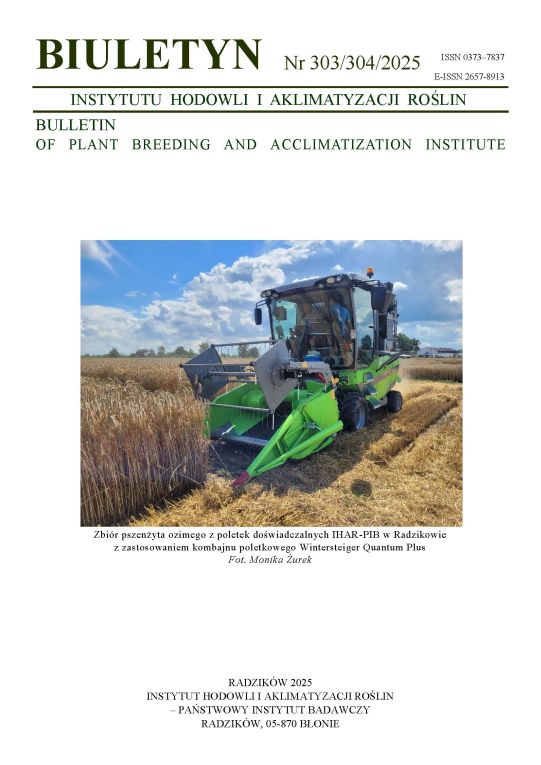Reaction of some winter wheat varieties to cultivation in the organic system
Jarosław Stalenga
iung@iung.pulawy.plZakład Systemów i Ekonomiki Produkcji Roślinnej, Instytut Uprawy Nawożenia i Gleboznawstwa — PIB, Puławy (Poland)
Krzysztof Jończyk
Zakład Systemów i Ekonomiki Produkcji Roślinnej, Instytut Uprawy Nawożenia i Gleboznawstwa — PIB, Puławy (Poland)
Abstract
The aim of investigations was to evaluate the reaction of some winter wheat varieties to cultivation in the organic crop production system. The studies included analyses of the following features: yielding, dry matter accumulation, nitrogen nutrient status and the Leaf Area Index (LAI). The data came from the field experiment, which was set up in 1994 at the Experimental Station in Osiny (Lublin province) to compare different crop production systems. The investigations were carried out in 2003–2005 in the winter wheat field. Six varieties of common winter wheat (Mewa, Roma, Kobra, Sukces, Zyta and Korweta) and one variety of spelt winter wheat (Schwabenkorn) were evaluated. In 2005, three “old” winter wheat varieties (Ostka Kazimierska, Kujawianka Więcławicka and Wysokolitewka Sztywnosłoma) were additionally included. The highest yields were recorded for the varieties Mewa (4.27 t/ha) and Sukces (4.21 t/ha). The common varieties yielded by about 2 t/ha higher than the “old” ones. Var. Zyta and spelt wheat accumulated the largest amounts of dry matter. The “old” winter wheat varieties and spelt wheat were characterised by the highest LAI values. Variety Mewa was found to be in the best nitrogen nutrient status. This variety seems to be the most useful in organic farming. Also vars. Zyta and Sukces and spelt wheat, seem to have good perspectives. The efficiency of nitrogen utilization seems to be an interesting test to examine the usefulness of cereal varieties in organic farming.
Keywords:
organic farming, variety selection, winter wheatReferences
Bergmann W. 1992. Nutritional disorders of plants: development, visual and analytical diagnosis. Gustav Fischer Verlag Jena, Stuttgart, New York.
Google Scholar
Eisele J. A., Köpke U. 1997. Choice of cultivars in organic farming: new criteria for winter wheat ideotypes. Pflanzenbauwissenschaften 1 (1): 19 — 24.
Google Scholar
Feledyn-Szewczyk B., Duer I. 2006. Ocena konkurencyjności odmian pszenicy ozimej uprawianej w ekologicznym systemie produkcji w stosunku do chwastów. J. Res. Applic. Agricult. Eng. 51(2): 30 — 35.
Google Scholar
Fotyma E., Pecio A. 1999. Zależność pomiędzy zawartością azotu a nagromadzaniem suchej masy przez zboża. Pam. Puł. 114: 93 — 100.
Google Scholar
Fotyma E. 2002. Zróżnicowanie odmianowe zawartości chlorofilu w liściach zbóż ozimych. Pamiętnik Puławski 130: 171 — 178.
Google Scholar
Jończyk K. 2002. Reakcja wybranych odmian pszenicy ozimej na uprawę w różnych systemach produkcji roślinnej. Pam. Puł. 130/I: 339 — 345.
Google Scholar
Kuś J., Mróz A., Jończyk K. 2006. Nasilenie chorób grzybowych wybranych odmian pszenicy ozimej w uprawie ekologicznej. J. Res. Applic. Agricult. Eng., 2006, 51 (2): 88 — 93.
Google Scholar
Leibl M., Petr J. 2000. Varieties of winter wheat for ecological farming. In: Proc. of the 13th Int. IFOAM Scien. Conf. in Basel. Vdf Hochschulverlag AG an der ETH Zurich: 243.
Google Scholar
Lemaire G., Gastal F. 1997. N uptake and distribution in plant canopies. In: Lemaire G. (ed.) Diagnosis of the nitrogen in crops. Springer-Verlag Berlin Heidelberg: 3 — 43.
Google Scholar
Lista opisowa odmian. 2003. COBORU, Słupia Wielka.
Google Scholar
Stalenga, J. 2002. Zastosowanie testu SPAD do oceny stanu odżywienia azotem pszenicy ozimej w różnych systemach produkcji roślinnej. Nawozy i Nawożenie 2 (11): 137 — 144.
Google Scholar
Stalenga J. 2007. Applicability of different indices to evaluate nutrient status of winter wheat in the organic system. Journal of Plant Nutrition 30 (3): 351 — 365.
Google Scholar
Authors
Jarosław Stalengaiung@iung.pulawy.pl
Zakład Systemów i Ekonomiki Produkcji Roślinnej, Instytut Uprawy Nawożenia i Gleboznawstwa — PIB, Puławy Poland
Authors
Krzysztof JończykZakład Systemów i Ekonomiki Produkcji Roślinnej, Instytut Uprawy Nawożenia i Gleboznawstwa — PIB, Puławy Poland
Statistics
Abstract views: 168PDF downloads: 130
License
Copyright (c) 2007 Jarosław Stalenga, Krzysztof Jończyk

This work is licensed under a Creative Commons Attribution-ShareAlike 4.0 International License.
Upon submitting the article, the Authors grant the Publisher a non-exclusive and free license to use the article for an indefinite period of time throughout the world in the following fields of use:
- Production and reproduction of copies of the article using a specific technique, including printing and digital technology.
- Placing on the market, lending or renting the original or copies of the article.
- Public performance, exhibition, display, reproduction, broadcasting and re-broadcasting, as well as making the article publicly available in such a way that everyone can access it at a place and time of their choice.
- Including the article in a collective work.
- Uploading an article in electronic form to electronic platforms or otherwise introducing an article in electronic form to the Internet or other network.
- Dissemination of the article in electronic form on the Internet or other network, in collective work as well as independently.
- Making the article available in an electronic version in such a way that everyone can access it at a place and time of their choice, in particular via the Internet.
Authors by sending a request for publication:
- They consent to the publication of the article in the journal,
- They agree to give the publication a DOI (Digital Object Identifier),
- They undertake to comply with the publishing house's code of ethics in accordance with the guidelines of the Committee on Publication Ethics (COPE), (http://ihar.edu.pl/biblioteka_i_wydawnictwa.php),
- They consent to the articles being made available in electronic form under the CC BY-SA 4.0 license, in open access,
- They agree to send article metadata to commercial and non-commercial journal indexing databases.
Most read articles by the same author(s)
- Jan Kuś, Jarosław Stalenga, Prospects for development of different farming systems in Poland , Bulletin of Plant Breeding and Acclimatization Institute: No. 242 (2006): Special issue
- Krzysztof Jończyk, Andrzej Kawalec, The preliminary estimation of usefulness of some winter wheat varieties to cultivation in different crop production systems , Bulletin of Plant Breeding and Acclimatization Institute: No. 220 (2001): Regular Issue













